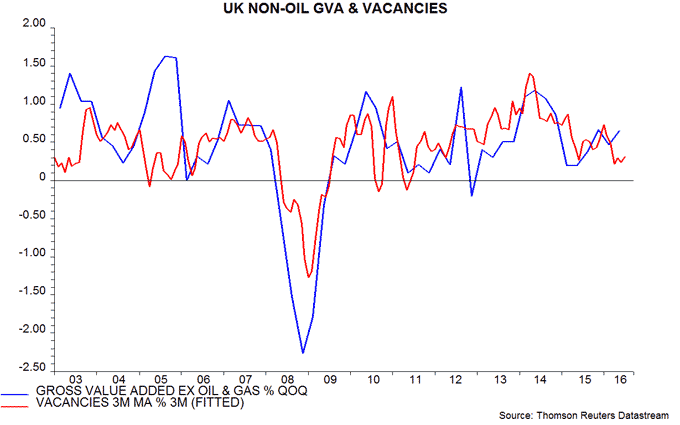UK vacancies data covering July suggest that the economy has slowed sharply but is not contracting – contrary to the recessionary message from the high-profile but often unreliable purchasing managers’ surveys, which appear to have played a key role in the MPC’s decision to launch further policy easing.
The vacancies numbers are reported on a three-month moving average basis. The average fell from 744,000 in June to 741,000 in July, a decline of 0.4%. A previous post argued that vacancies would need to fall by 4% over three months to suggest that the economy is contracting, based on the historical relationship with gross value added (GVA). The decline between June and July is beneath the implied monthly threshold of 1.3%.
The chart shows fitted values of a regression of quarterly non-oil GVA growth on the three-month change in vacancies. The latest three-month change (i.e. a decline of 0.9% between April and July) suggests weak GVA expansion.
The Office for National Statistics makes available the monthly non-seasonally-adjusted data underlying the reported three-month moving average. This single-month series, adjusted for seasonal factors using the X-12 procedure, fell by 1.0% between June and July – also below the contraction threshold.
The July vacancies number tallies with the Reed job index, a measure of online listings, which edged lower last month but remains close to a May peak – see the previous post for more discussion and a chart. The Reed index is released two weeks before the official vacancies number, with an August reading due in early September.
Claimant-count unemployment, meanwhile, fell by 8,600 in July, the first decline since February, defying expectations of a sizeable rise. This series, while timely, usually lags economic activity and may have been distorted as an indicator recently as claimants have been moved from job-seeker's allowance to universal credit.
The July vacancies number is modestly reassuring but the assessment of the economic outlook here will depend on post-Brexit vote monetary trends, with July data scheduled for release on 30 August.